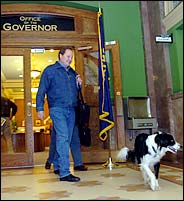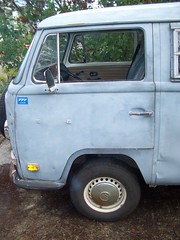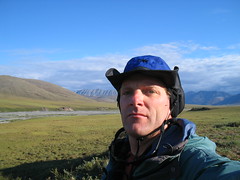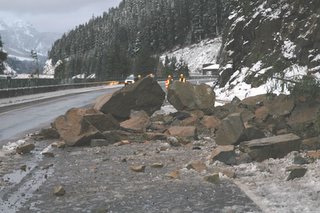 By TIMOTHY EGAN
By TIMOTHY EGAN
Published: November 21, 2005HELENA, Mont., Nov. 15 - If the vast, empty plain of eastern
Montana is the Saudi Arabia of coal, then Gov. Brian Schweitzer, a prairie populist with a bolo tie and an advanced degree in soil science, may be its Lawrence.
Gov. Brian Schweitzer of Montana on Wednesday, leaving the Capitol in Helena with Jag, his border collie.
Rarely a day goes by that he does not lash out against the "sheiks, dictators, rats and crooks" who control the world oil supply or the people he calls their political handmaidens, "the best Congress that Big Oil can buy."
Governor Schweitzer, a Democrat, has a two-fisted idea for energy independence that he carries around with him. In one fist is a shank of Montana coal, black and hard. In the other fist is a vial of nearly odorless clear liquid - a synthetic fuel that came from the coal and could run cars, jets and trucks or heat homes without contributing to global warming or setting off a major fight with environmental groups, he said.
"Smell that," Mr. Schweitzer said, thrusting his vial of fuel under the noses of interested observers here in the capital, where he works in jeans with a border collie underfoot. "You hardly smell anything. This is a clean fuel, converted from coal by a chemical process. We can produce enough of this in Montana to power every American car for decades."
Coal-to-fuel conversion, which was practiced out of necessity by pariah nations like Nazi Germany and South Africa under apartheid, has been around for more than 80 years. It is called the Fischer-Tropsch process. What is new is the technology that removes and stores the pollutants during and after the making of synthetic fuel; add to that high oil prices, which have suddenly made this form of energy alchemy feasible. The coal could be converted into gasoline or diesel, which would run cars, or into other types of fuel.
With coal reserves of about 120 billion tons, Montana has one-third of the nation's total and a tenth of the global amount. Most of it is just under the prairie grass in the depopulated ranch country of eastern Montana. Mr. Schweitzer wants to plant coal-to-fuel factories in towns that have one foot in the grave. It may not provide enough fuel to wean the West off imported oil, but it may be enough to show the rest of the country that there is another way, he said.
"This country has no energy plan, no vision for the future," said Mr. Schweitzer, who spent seven years in Saudi Arabia on irrigation projects. "We give more tax breaks and money for oil, and what do we get? Three-dollar gas and wars in the Middle East. If you want to control the destiny of this country, it's going to be with synthetic fuels."
For now, the governor's ideas are just speculative. Although several energy companies have expressed interest in building coal-to-fuel plants, no sites have been chosen or projects announced. Because it would be such a novel, financially risky undertaking, companies have been hesitant to go the next step. But Mr. Schweitzer hopes for a breakthrough, with several plants up and running within 10 years, and he says he does not need legislative approval to give the go-ahead if companies commit.
The governor has met with the president of Shell Oil, the chairman of General Electric and other captains of big energy, as well as with smaller companies that develop synthetic fuels.
"This is not a pipe dream," said Jack Holmes, the president and chief executive of Syntroleum, an Oklahoma company that has a small synthetic fuels plant and wants to build something bigger. "What's exciting about this process is you don't have to drill any wells and you don't have to build any infrastructure, and you'd be putting these plants in the heartland of America, where you really need the jobs."
Certainly jobs are a big motivating factor. Montana is a poor state and ranks last in average wages. Mr. Schweitzer, whose approval rating is near 70 percent, says thousands of good-wage jobs can be gained in towns that are dying.
He is also promoting wind energy and the use of biofuels, using oil from crops like soybeans as a blend. The governor signed a measure this year that requires Montana to get 10 percent of its energy from wind power by 2010, a goal he said would be reached within a few years. Still, the Big Sky State, with a population under a million, has fewer people than the average metro area of a midsize American city, and its influence is limited. The governor acknowledged as much.
"I'm just a soil scientist trying to get people in Washington, D.C., to take the cotton out of their ears," Mr. Schweitzer said with somewhat practiced modesty. "But if we can change the world in Montana, why not try it?"
By some estimates, the United States has enough coal to take care of its energy needs for 800 years. The new, cleaner technology stores the pollutants in the ground or processes them for other uses.
The United States imports about 13 million barrels of oil a day. To replace that oil would be a monumental undertaking, with hundreds of coal-to-fuel plants. But Mr. Schweitzer points to South Africa, where a single 50-year-old plant provides 28 percent of the nation's supplies of diesel, petrol and kerosene. But the South African plant uses old technology that does not remove the pollutants.
In this country there is a small factory in North Dakota that converts coal to natural gas. And Pennsylvania is moving forward on a plan to produce diesel from coal. Neither of these plants would come close to the scale of the plants Mr. Schweitzer is envisioning in Montana, where it would cost upward of $7 billion to build a plant that could turn out 150,000 barrels of synthetic fuel a day, for about $35 a barrel.
One surprising thing, thus far, is that many people in the environmental community have not rejected the coal-to-fuel idea out of hand. Environmentalists like the process for producing clean fuels from coal. They say the technology is there and it can be done in coal-rich empty quarters of eastern Montana, North Dakota or Wyoming.
Still, they worry about strip mining the ranch country and about whether there will be a global commitment to make synthetic fuels the clean way rather than in a dirtier way along the lines of a plan in China, where the government has joined with major global oil companies to build about a dozen coal-to-fuel plants.
"It's a very interesting moment in energy history," said Ralph Cavanagh, an energy policy expert at the Natural Resources Defense Council, one of the nation's most powerful environmental groups. "Certainly this process can be done. This is a promising direction. The question is, Are we going to do it clean?"
Because there is no federal mandate to process coal in a way that reduces the emissions that can cause global warming, Mr. Cavanagh says he fears that any new coal operations will simply add new pollutants to the atmosphere. Coal plants without the cleaning technology are the biggest source of man-made carbon dioxide, a gas that is considered a central contributor to the warming of the earth, according to many studies.
There is another problem as well. Some Montana ranchers and environmentalists who fought big coal-mining proposals in the 1970's are worried about what new mining will do to the grasslands.
"The governor's idea is a big one," said Helen Waller, a farmer who is active with the Northern Plains Resource Council, a Montana environmental group. "I'm not sure it's the best one. I don't think there's any such thing as clean coal. And even if there were, it would require a lot of productive ranchland to be ripped up."
Mr. Schweitzer said the mining could be done in a way that restored the land afterward. "I call it deep farming," he said. "You take away the top eight inches of soil, remove the seam of coal, and then put the topsoil back in."
But given Montana's history of abuse by mining companies - the giant open-pit mine in Butte is the most visible legacy of a bygone era - some Montanans remain skeptical.
"I just think there's a better way that doesn't involve tearing up productive ranchland," Ms. Waller said.







